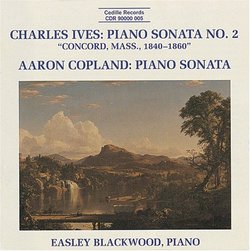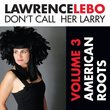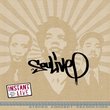| All Artists: Charles Ives, Aaron Copland, Easley Blackwood Title: Piano Sonatas by Ives and Copland; Piano Sonata No. 2 "Concord Mass, 1840-1860" Members Wishing: 1 Total Copies: 0 Label: Cedille Release Date: 8/24/1996 Genres: Folk, International Music, Classical Styles: British & Celtic Folk, Europe, Britain & Ireland, Chamber Music, Forms & Genres, Sonatas, Historical Periods, Classical (c.1770-1830), Modern, 20th, & 21st Century Number of Discs: 1 SwapaCD Credits: 1 UPCs: 735131900522, 789368512522, 669910242063 |
Search - Charles Ives, Aaron Copland, Easley Blackwood :: Piano Sonatas by Ives and Copland; Piano Sonata No. 2 "Concord Mass, 1840-1860"
 | Charles Ives, Aaron Copland, Easley Blackwood Piano Sonatas by Ives and Copland; Piano Sonata No. 2 "Concord Mass, 1840-1860" Genres: Folk, International Music, Classical
Few pianists have had the courage to tackle Ives' "Concord" Sonata in public. Easley Blackwood made it his signature piece. Blackwood earned high praise for his concert performances of Ives' "Concord" Sonata, a set of t... more » |
Larger Image |
CD DetailsSynopsis
Album Description Few pianists have had the courage to tackle Ives' "Concord" Sonata in public. Easley Blackwood made it his signature piece. Blackwood earned high praise for his concert performances of Ives' "Concord" Sonata, a set of transcendentalist meditations named for Emerson, Hawthorne, the Alcott family and Thoreau, all of whom lived in Concord, Mass. Critic Max Harrison of The London Times declared Blackwood's performance of the piece "the finest account I have ever heard." Chicago Symphony Orchestra flutist Richard Graef, a Blackwood colleague in the Grammy Award-winning Chicago Pro Musica chamber music ensemble, performs in the sonata's "Thoreau" movement. Copland's Piano Sonata, long overshadowed by his populist works, represents his most profound and personal thoughts. A surprisingly lively middle movement explores fast rhythms in irregular, rapidly changing meters. "I never would have thought of those rhythms if I had not been familiar with jazz," Copland remarked. Similar CDs
|
CD ReviewsTranscendentalism for Piano Peter P. Fuchs | Washington, DC | 11/25/2007 (5 out of 5 stars) "This is, to my mind, simply the best Ives Concord Sonata ever recorded. Easley Blackwood brings utter musicality to every phrase of this difficult work. The thorny passages have a real --Acheronta movebo --authenticity which avoids sound effects which distort so many other renderings of the work. Bravo to Supreme Court Justice Ruth Bader Ginsburg's son who, I have heard was the driving force behind Cedille Records. He really contributed to musical history with this Easley Blackwood recording. It would be hard to fault anyone for not having made it through Ives own long-winded essays which are a sort of prolegomenon to the Concord Sonata. But I do note that most interpreters are not sufficiently familiar with the essays to have at least sifted out the intensely poetical turn to Ives' mind and creative imagination. Blackwood's Concord is the only one that brings out that poetic quality which is a justification for Ives' admittedly unreadable prose contribution."
|

 Track Listings (7) - Disc #1
Track Listings (7) - Disc #1


